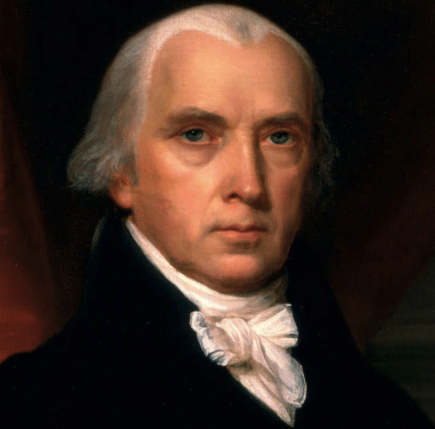James Madison: Thoughts from Federalist 37, Select Quotes

The Federalist Papers were written, primarily by James Madison and Alexander Hamilton, to both advocate for and sell the Constitution of 1787, and counter the arguments of the Anti-Federalists, so-called.
The Federalist Papers give unique insights into the processes that produced the Constitution of the United States and unpack a lot of philosophical thinking of their authors.
This selection is engineered to merely give a few snap-shots into the thinking of James Madison as he penned Federalist 37. Of particular interest is his thinking on the process of writing and interpreting new laws.
August Glen-James, editor
The Essential Spirit of Moderation
It is a misfortune, inseparable from human affairs, that public measures are rarely investigated with that spirit of moderation, which is essential to a just estimate of their real tendency to advance, or obstruct, the public good; and that spirit is more apt to be diminished than promoted, by those occasions which require an unusual exercise of it.
Energy and Stability in Government
Energy in government, is essential to that security against external and internal danger, and to that prompt and salutary execution of the laws, which enter int the very definition of good government. Stability in government, is essential to national character, and to the advantages annexed to it, as well as to that repose and confidence in the minds of the people, which are among the chief blessings of civil society.
The Genius of Republican Liberty
The genius of republican liberty, seems to demand on one side, not only that all power should be derived from the people; but, that those intrusted (sic) with it should be kept in dependence on the people, by a short duration of their appointments; and that, even during this short period, the trust should be placed not in a few, but in a number of hands. Stability, on the contrary, requires, that the hands, in which power is lodged, should continue for a length of time the same. A frequent change of men will result from a frequent return of electors; and a frequent change of measures, form a frequent change of men: whilst energy in government required not only a certain duration of power, but the execution of it by a single hand.
The Processes of Producing New Laws
All new laws, though penned with the greatest technical skills, and passed on the fullest and most mature deliberation, are considered as more or less obscure and equivocal, until their meaning be liquidated and ascertained by a series of particular discussions and adjudications. Besides, the obscurity arising from the complexity of objects, and the imperfection of the human faculties, the medium through which the conceptions of men are conveyed to each other, adds a fresh embarrassment. The use of words is to express ideas. Perspicuity therefore requires, not only that the ideas should be distinctly formed, but that they should be expressed by words distinctly and exclusively appropriated to them. But no language is so copious as to supply words and phrases for every complex idea, or so correct as not to include many, equivocally denoting different ideas. Hence it must happen, that however accurately objects may be discriminated in themselves, and however accurately the discrimination may be conceived, the definition of them may be rendered inaccurate, by the inaccuracy of the terms in which it is delivered. And this unavoidable inaccuracy must be greater or less, according to the complexity and novelty of the objects defined. When the Almighty himself condescends to address mankind in their own language, his meaning, luminous as it must be, is rendered dim and doubtful, by the cloudy medium through which it is communicated. . . . Here then are three sources of vague and incorrect definitions; indistinctness of the object, imperfection of the organ of perception, inadequateness of the vehicle of ideas.
The Reconciling of Discordant Opinions and the Constitutional Convention
The history of almost all the great councils and consultations, held among mankind for reconciling their discordant opinions, assuaging their mutual jealousies, and adjusting their respective interests, is a history of factions, contentions, and disappointments; and may be classed among the most dark and degrading pictures, which display the infirmities and depravities of the human character. If, in a few scattered instances, a brighter aspect is presented, they serve only as exceptions to admonish us of the general truth; and by their luster to darken the gloom of the adverse prospect to which they are contrasted In revolving the causes from which these exceptions result, and applying them to the particular instance before us, we are necessarily led to two important conclusions. The first is, that the convention must have enjoyed in a very singular degree, an exemption from the pestilential influence of party animosities; the disease most incident to deliberative bodies, and most apt to contaminate their proceedings. The second conclusion is, that all the deputations composing the convention, were either satisfactorily accommodated by the final act; or were induced to accede to it, by a deep conviction of the necessity of sacrificing private opinions and partial interests to the public good; and by a despair of seeing this necessity diminished by delays or by new experiments.
